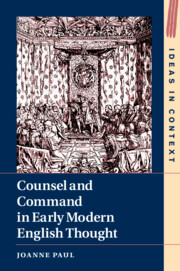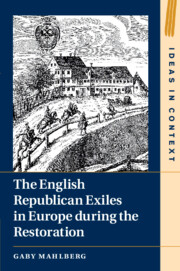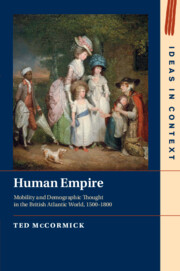Counsel and Command in Early Modern English Thought
While it has often been recognised that counsel formed an essential part of the political discourse in early modern England, the precise role that it occupied in the development of political thinking has remained obscure. This comprehensive and rigorous study of early modern English political counsel establishes the importance of the relationship between political counsel and the discourse of sovereignty. Tracing the changes and evolution of writings on political counsel during the 'monarchy of counsel', from the end of the Wars of the Roses to the end of the English Civil War, Joanne Paul examines English thought in its domestic and transnational context, providing an original account of the relationship between counsel and emerging conceptions of sovereignty. Formed at the conjunction of the history of political thought and English political history, this book grounds textual analysis within the context of court politics, intellectual and patronage networks, and diplomacy.
- The first comprehensive exploration of early modern English political counsel in the Tudor and Stuart periods
- Goes beyond the traditional 'canonical' thinkers in the history of political thought by considering a broader range of political commentators and actors in this period
- Suggests a new understanding of the origins of a modern politics of sovereignty in the early modern discourse of counsel
Reviews & endorsements
'This is an impressive survey of political philosophy … This thoughtful survey covers a great deal of ground on topics of varying levels of familiarity.' J. T. Rosenthal, Choice
'It is a slim but important book, as the proven expert on Tudor England rightly points out in the introduction that the topic has received far too little attention so far. It is particularly groundbreaking that the author presents for the first time a coherent, diachronic argument on the fundamental importance of political advice in the 16th and 17th centuries, which is tailored to England in the manner presented, but is also of interest beyond … In developing the argument and the description of the individual authors and texts, Paul acts with a confident, concise and precise language and a confident handling of contemporary sources and literature.' Hannes Ziegler, Zeitschrift für Historische Forschung
Product details
September 2022Paperback
9781108748254
265 pages
228 × 152 × 16 mm
0.41kg
Available
Table of Contents
- Part I:
- 1. The humanist counsellor
- 2. The right timing of counsel
- Part II:
- 3. Machiavellian counsel
- 4. Political prudence
- 5. Late Tudor counsellors
- Part III:
- 6. Reason of state and the counsellor
- 7. Counsel, command and the Stuarts.






